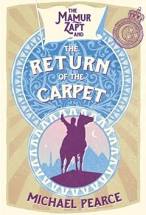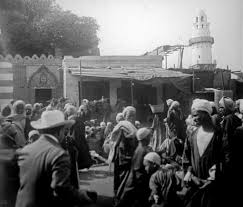Mamur Zapt and the Return of the Carpet (2001) by Michael Pearce
Good Reads meta-data is 240 pages, rated 3.58/5.00 by 200 litizens.
Genre: krimi, period

Verdict: Intriguing
Cairo, 1906 (or so). The Brits have run the sand show for thirty years on the pretext of safeguarding the Suez Canal. The Kheve likes having the Brits to blame everything on and to use against the many enemies of his rule. Cairo is polyglot: Arabs, Greeks, Jews, Syrians, Nubians, Copts, and others jostle along. The Greek Coptic Christians offer essential services as the educated professional class but are despised by many Moslems as infidels. These Copts by the way are the attenuated descendants of the Ptolemaic Macedonians from the time of Alexander the Great.
The fiction at the time was that Egypt was a province of the Ottoman Empire with the Kheve as the governor delegating for the Sultan in Constantinople. Fiction.

Our hero is the Mamur Zapt. Huh? That is a position. The incumbent is a Welsh captain whose name I have briefly forgotten. He makes too much of being somehow an outsider for being Welsh.
Why that position and most of the others are given Arabic names by the author is anyone’s guess. It is certainly distracting and confusing, so if that is the purpose, then it works. But to get back to MZ, that is, the political intelligence officer. While the Egyptian police look after the camel traffic, and the local Prosecutor deals with crime against persons and property, the MZ takes care of political liaison. The main political issue is Egyptian nationalism of one kind or another.
A hapless sap takes a shot at a local politico and the Prosecutor and the MZ join forces to figure it out. Clearly the shooter was a pawn, so who moved him, and why? They go hither and thither in colourful Cairo and gradually learn to trust each other as they piece together the intel. It a nice travelogue.
Eventually they figure it out and the MZ finds a way to use the knowledge as a prism to split the nationalists into another set of factions, more interested in undermining each other than the British. Kind of like the US Democratic Party, more interested in purity than winning.
The carpet does not fly but rather is a ceremonial festival. That was a let down.
It is a police procedural set in exotic Cairo. One of the strong points is the interrogations. These are very well done. Continued questioning, urging the interlocutor to be precise and to describe everything is very effective in bringing out details. Also I rather liked the MZ’s deft hand in meting out kinds of justice to the several offenders, particularly including sending the sneering Turkish counsel back to the Sultana’s embrace. Although packing one youthful idealist off to study law at Sorbonne did seem excessive punishment for his crime: the hard, kindergarten-size benches, begrimed, and draughty rooms, the boring drone from the front of the room, the BO of other students. Ugh!
Enjoyed the setting and have already started and finished the second in the series which has many titles.

Michael Pearce has another series, too: see A Deadman in Trieste discussed elsewhere on this blog. To this reader the Cairo titles in hand are more assured than the Trieste one.
